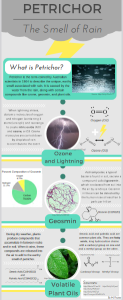
There have been countless times when I’ve gotten a whiff of pipe tobacco and been instantly transported to riding around in a truck with my great grandfather. He died when I was a young girl, but 40 years later, one sniff of a pipe takes my brain directly to fond and vivid memories of him. The olfactory nerve enables smell, and is tied closely to the limbic system. This is the most “primitive” part of our brain, where our memories and emotions are processed.
Often playing third or fourth fiddle to sight and hearing, our sense of smell serves an important role in the way we experience the world. Many studies have shown that people who have lost their sense of smell experience higher rates of depression, as they lose daily joys (and sources of dopamine) like tasting good food or smelling something pleasant in the air. Besides finding little satisfaction in eating and not being aware if food is spoiled, it’s common for them to experience increased anxiety from not relating well to others in typical or even dangerous human experiences, such as being unable to smell smoke or a potentially noxious gas.

I started thinking about the importance of smell because of petrichor. It’s not a word most of us would use regularly, but I’d wager many of us would recognize it if we walked outside during a light rainstorm. Petrichor is what we smell as rain hits the ground. The phenomenon has been in scientific literature for centuries, but the mechanism was first explained in the 1960’s by Australian scientists. The name petrichor comes from the Greek words “petra” (rock) and “ikhor” (blood of the gods). I am not sure if it is apt to refer to a smell as peaceful, but that’s how it makes me feel. It might also be described as fresh, earthy, or clean.
So, where does this smell come from? It is a complex interaction of raindrops, a soil bacteria byproduct, and fatty acids found in plants. During a storm, lighting divides oxygen and nitrogen molecules in the atmosphere, creating nitric oxide and ozone. When people say they smell rain, they’re smelling ozone in the wind. That ozone is also carried to the ground in raindrops. When drops of water hit the soil, they react and release geosmin, a carbon-based compound secreted by Actinomycete bacteria. Naturally occurring in the soil, this bacteria is crucial for plant biodegradation, and an important component of creating compost. The ozone-generated geosmin is then joined by stearic and palmitic acid, plant oils that are produced and built up in soils over time. When rain starts—especially a light drizzle, which is most effective at releasing aerosols—these volatile oils are vaulted into the air.

New research also indicates that the scent of geosmin attracts insects to bacteria in the soil. A study conducted in Sweden just a few years ago indicated tiny arthropods called springtails are attracted to the scent, eating the bacteria that produced it and spreading spores. This works essentially the same way as birds or bats eating fruit, then dispersing seeds through their waste. Springtails aren’t the only critters who pay attention to rain-induced scents. It turns out that camels are also highly sensitive to geosmin, using it to detect water sources up to 50 miles away in the barren desert.
Humans have an incredibly high sensitivity to geosmin. We can detect it at concentrations of 100 parts per trillion, which is far stronger than sharks’ ability to detect blood in the water. Scientists theorize that our uncanny sensibility to petrichor is related to the fact that we, too, are highly dependent on rain as a species. Being able to detect a fresh source of drinking or irrigation water would have been life or death for our earliest ancestors.
The next time it starts to drizzle, walk outside and take a deep breath. Think of petrichor as a perfume created by blending the sky, soil, and plants, then shared with those of us lucky enough to be outside at the onset of a summer rainstorm. I hope the scent conjures up happy memories for you, too.
 18
18
